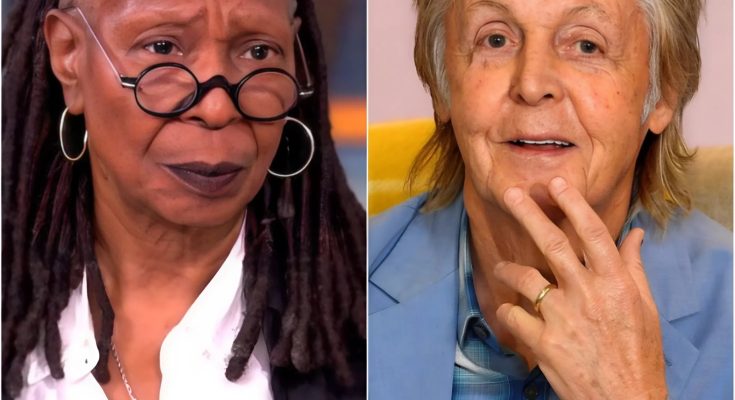In the world of live television, where emotions run high and the drama unfolds in real time, there are moments that stand out, not because of the spectacle or theatrics, but because of the power behind a single action or word. One such moment occurred when Paul McCartney, the legendary Beatle, found himself at the center of an intense exchange that would leave the world watching in disbelief. It wasn’t just a confrontation — it was a reminder of the quiet power that lies in words, composure, and the unspoken strength that can shift the energy of an entire room.
It all began with a seemingly innocent remark from Whoopi Goldberg, the beloved daytime television host, who dismissed Paul McCartney with the words, “He’s just a singer.” A statement that, on the surface, might seem harmless, but one that, in its essence, disregarded the very legacy McCartney had built — a legacy far beyond his musical talents, touching generations of listeners and shaping the world of music and culture.At that moment, Whoopi’s words set off a chain reaction. The studio, normally filled with chatter and the buzz of a live broadcast, went eerily silent as the camera zoomed in on Paul. For a brief second, he said nothing. He remained calm, his posture steady, almost as if he were letting the weight of the remark settle in the air. The tension was thick, the anticipation palpable. Viewers watching from home could feel the electricity in the room, unsure of how Paul would respond.

But Paul McCartney, a man who had spent decades in the limelight, who had faced criticism, adulation, and everything in between, chose not to react impulsively. Instead, he sat there — nodding slightly, taking a breath, and waiting. He let the moment stretch out, giving Whoopi and the audience time to think, to reflect.
Then, everything changed. As Whoopi continued, undeterred, Paul slowly lifted his head. He placed both hands firmly on the table, and with the calm precision that only someone of his stature could command, he delivered seven words — no more, no less. The words came with such quiet authority that they seemed to shake the very foundations of the studio.
The cameras continued rolling, capturing every second of the moment. Yet, for the first time in years of live television, the director didn’t dare to whisper the word “continue.” The air in the room hung heavy. Someone backstage let out a long breath, as if realizing the enormity of what had just happened. The guests in the studio, once chatty and lively, now stared down at the floor, unable to break the tension that had overtaken them. And Whoopi Goldberg? She remained completely silent. Not a word. Not even a sound. Just a blink. And then… the room was still.
What had just unfolded was nothing short of extraordinary. Paul McCartney, often labeled as “just a singer from another era,” had, in that one moment, done what few others could in the history of live television: he froze an entire studio. Not with anger or a dramatic outburst, but with the quiet, unshakable strength of someone who has spent a lifetime in the public eye and knows exactly how to wield the power of silence.

The silence was deafening. The world watched as Whoopi, the queen of daytime television, was left speechless — not because of anything Paul had shouted or raged against, but because of the gravity of his words. His response wasn’t loud, it wasn’t flashy, and it didn’t need to be. His words cut through the polished veneer of the media world that so often prioritizes drama and spectacle. With just seven words, Paul McCartney reminded everyone in that studio, and everyone watching at home, that sometimes the most powerful statements are the ones that don’t require a microphone or a stage.
What followed was an outpouring of admiration for Paul’s composure and dignity. This wasn’t about a battle of egos or a celebrity feud; this was about a man who, with quiet strength, made it clear that his legacy wasn’t one to be dismissed with a simple sentence. His words tore through a media façade that had been carefully constructed for decades — one that often favors the loudest voices and the most dramatic gestures. What Paul McCartney did that day was redefine what it means to be heard in an age dominated by noise and spectacle.
The clip of that moment has since been shared countless times. It’s not because Paul McCartney appeared powerful or intimidating. It’s because, in that fleeting moment, he reminded us all that true power doesn’t come from shouting the loudest or making the most noise. It comes from knowing who you are, standing firm in that knowledge, and speaking with authenticity. Paul’s words, simple and concise, tore through the superficiality of the media landscape and left an impact that could not be ignored.
So, what were those seven words that changed everything?

And why is this moment being hailed as the time a daytime icon lost her voice — live on air?
The answer lies not in the words themselves, but in the effect they had on everyone who heard them. In a world where we are constantly bombarded by voices trying to dominate and control the narrative, Paul McCartney’s response was a reminder that sometimes silence, dignity, and a few well-chosen words are the most powerful things of all.
It’s a moment that will be remembered for years to come — not because it was filled with drama or controversy, but because it was a quiet revolution. One that showed us that, even in a world that seems to prize spectacle over substance, there are still moments where the truth is allowed to shine through. In this moment, Paul McCartney proved that sometimes the most powerful voice is the one that speaks softly, but with the weight of a lifetime of experience behind it.



